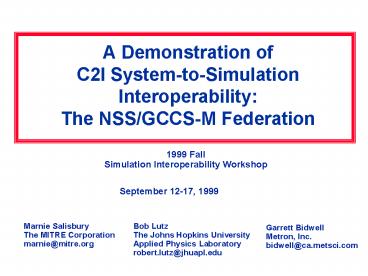A Demonstration of C2I SystemtoSimulation Interoperability: The NSSGCCSM Federation
1 / 12
Title:
A Demonstration of C2I SystemtoSimulation Interoperability: The NSSGCCSM Federation
Description:
Define target scenario. Develop initial FOM based on GCCS-M data requirements for track data ... Automates sending of attribute value updates ... –
Number of Views:59
Avg rating:3.0/5.0
Title: A Demonstration of C2I SystemtoSimulation Interoperability: The NSSGCCSM Federation
1
A Demonstration of C2I System-to-Simulation
Interoperability The NSS/GCCS-M Federation
1999 Fall Simulation Interoperability Workshop
September 12-17, 1999
Marnie Salisbury The MITRE Corporation marnie_at_mitr
e.org
Bob Lutz The Johns Hopkins University Applied
Physics Laboratory robert.lutz_at_jhuapl.edu
Garrett Bidwell Metron, Inc. bidwell_at_ca.metsci.com
2
Introduction
- There is a strong need within the DoD to develop
interoperable environments which link combat
simulations to Command, Control, and Intelligence
(C2I) systems - Operator/Staff training
- TE of C2I systems and networks
- Analysis of military tactics
- In the past, such environments were typically
point solutions, with little reuse possible - The HLA offers techniques and mechanisms which
facilitate reuse and interoperability in hybrid
simulation/C2I system environments - Experiments/pathfinders are needed which
demonstrate the utility of the HLA in linking
combat simulations to C2I systems
3
Project Purpose
- Demonstrate the utility and feasibility of
linking Maritime DII COE-based C2I systems with
Naval simulations in an HLA federation - Simulation(s) provide Common Tactical Picture
(CTP) stimulus for C2I systems - C2I systems can interject actions/decisions/orders
based on CTP, which the simulation(s) react to
and reflect in a dynamically changing CTP - Facilitates meaningful training for C2I system
users
4
Specific Project Objectives
- Demonstrate a working HLA federation which
includes a C2I system (GCCS-M) and a simulation
(NSS) - Demonstrate that NSS can generate the dynamic CTP
needed to stimulate GCCS-M, and can react
realistically to C2I system user commands - Demonstrate that GCCS-M can accept and display
CTP data from NSS, and can issue user commands
based on that data - Develop a reusable FOM subset for future
federations which include DII COE systems and
simulations - Exercise the FEDEP in a C2I system user training
context
5
Federates
- Global Command and Control System - Maritime
(GCCS-M) - Highest level Naval command and control system
- Provides a wide variety of tactical decision
support, information management, and display
applications - Operational on most surface combatants and
command centers throughout the Navy - DII COE compliant
- Naval Simulation System (NSS)
- Monte Carlo simulation system of Naval/Joint
operations - Supports fleet exercises and C4ISR analyses
- Capable of representing space, air, sea, and land
forces - Supports varying levels of user selectable
resolution - Can be used as a Tactical Decision Aid (TDA) for
Course-of- Action (COA) assessments - Will undergo DII COE compliance testing in FY00
6
NSS/GCCS-M Federation
GCCS/M
NSS
RTI Interface
RTI Interface
b
a
b
RTI
a
- Data Flows
- (a) Air, surface, and subsurface track data
- (b) Orders
- Position of Intended Movement (PIM) data
- Formation orders
7
Program Plan
- Phase 1 Following the FEDEP, establish
federation and demonstrate basic functionality - Define target scenario
- Develop initial FOM based on GCCS-M data
requirements for track data - Demonstrate that NSS can generate and send track
data to GCCS-M according to FOM - Demonstrate that GCCS-M can accept and display
track data from NSS according to FOM - Demonstrate that GCCS-M can send PIM Track
interactions to NSS, and that NSS can receive
them
8
Phase I Accomplishments
- Federation Scenario Defined
- Based on prior SWATS study
- Conceptual Model reflected in scenario
Define Federation Objectives 1
- Integration testing (May 10-14)
- Verified that the fedexec was created, and
federates joined - Verified accuracy of FOM data exchanges
- Verified that track data was displayed properly
- Developed plan for Phase II activities
Develop Federation Conceptual Model 2
Design and Develop Federation 3
- Kickoff Meeting held March 3
- Convened Federation Development Team
- Reviewed project requirements and and objectives
- Developed initial project plan
- Telecons scheduled for general coordination
Integrate and Test Federation 4
Execute Federation and Prepare Results 5
- Initial FOM developed
- H/W and S/W issues resolved
- Federate testing completed
- Integration Test Plan completed (Phase 1)
- NSS H/W and S/W installed at NRL
9
SWATS Scenario
10
GCCS-M Interface Design
GCCS-M Workstation
TDBM API
COP (application)
socket
RTI API
GCCS Amb
TDBM libs
TDBM
socket
RTI 1.3 libraries
DII COE Kernel
TCP/IP
RTI-based FOM data exchanges over LAN or WAN
11
NSS Interface Design
- HLA Integration Framework
- Middleware layer which insulates simulation code
from RTI-specific code - Facilitates HLA-related tasks that the simulation
must perform - Automates sending of attribute value updates
- Maintains all class and object instance
identifiers - Performs all necessary data formatting/translation
- Allows the simulation to be run in either a
stand-alone or federation mode - GCCS-M is used as a surrogate for an existing
commander representation within NSS - NSS commander object that performs data fusion
instead hands off simulated perception data to
GCCS-M - Operator commands from GCCS-M are handed off to
NSS commander object, which then responds as if
the orders were generated internal to the
simulation
12
Next Steps
- Phase II
- Mid-May through late-September
- Implement/demonstrate training scenario
- Variable execution speeds
- Implement additional GCCS-M actions/commands
- Screen Kilo repositioning
- Whiskey repositioning
- Phase III
- Early October through late-December
- Generate multiple commander perspectives
simultaneously using DDM services (tentative) - Utilize additional GCCS-M mission applications
(tentative) - Waterspace Management
- Tactical Warning Segment































